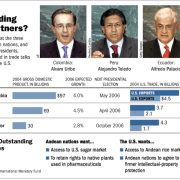11-Jan-2006
IRC Americas Program
A key argument used by US transnationals and the Bush administration to pass the Central America Free Trade Agreement (CAFTA)—that Central American countries themselves needed and wanted the agreement—has broken down on the eve of implementation of the controversial pact. This is a summary of the status of CAFTA implementation in each country.
4-Jan-2006
Dominican Today
National Merchants and Entrepreneurs Federation president Antonio Cruz assured today that there is generalized disarray throughout the Dominican Republic with initial implementation of the tax reform, and requested the government to reconsider enforcing it as of next July when CAFTA comes into effect.
2-Jan-2006
The New Standard
As CAFTA member-nations struggle to comply with the free trade pact’s requirements, opponents of the deal say the delays show how unpopular and undemocratic the mandated reforms are.
22-Dec-2005
Dominican Today
The American Chamber of Commerce (Amcham) reacted yesterday with disbelief to the official announcement that the Dominican Republic postponed entering the Free Trade Agreement till July 2006.
22-Dec-2005
Dominican Today
The decision to maintain the exchange commission at a rate of 9% during 2006, plus duty charges to be collected during the first 6 months next year prior to entering the DR-CAFTA would give the Dominican government an extra-budgetary income of approximately RD$9.3 billion.
9-Dec-2005
Dominican Today
It is still unclear whether the DR-Central America and US Free Trade Agreement (DR-CAFTA) will start in January 2006, and if it does, most of the Central American countries lag in preparation to enter commercial activity.
4-Dec-2005
Wall Street Journal
President Bush is starting to embrace a different political strategy for getting trade agreements through Congress: bipartisanship.
3-Nov-2005
Dominican Today
Associations in the Dominican farming sector today rejected some of the measures recommended by the International Monetary Fund (IMF) and requested from the government to establish a program to shore the sector up, prior to implementing the Free Trade Agreement (FTA) with the United States.





